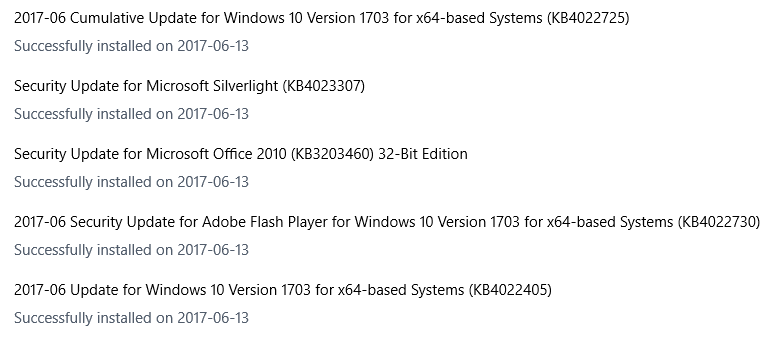-----BEGIN PGP SIGNED MESSAGE-----
Hash: SHA256
********************************************************************
Title: Microsoft Security Update Releases
Issued: June 13, 2017
********************************************************************
Summary
=======
The following CVEs have undergone a major revision increment.
* CVE-2017-0167
* CVE-2016-3326
Revision Information:
=====================
CVE-2017-0167
- Title: CVE-2017-0167 | Windows Kernel Information Disclosure
Vulnerability
- https://portal.msrc.microsoft.com/en-us/security-guidance
- Reason for Revision: To comprehensively address CVE-2017-0167,
Microsoft has released security update 4022887 for supported
editions of Windows Server 2008, and Monthly Rollup 4015549 and
Security Update 4015546 for supported editions of Windows 7 and
Windows Server 2008 R2. Microsoft recommends that customers
running any of these affected editions of Windows should install
the applicable update to be fully protected from this
vulnerability. See Microsoft Knowledge Base Article 4022887,
Microsoft KB4015549 Release Notes, or KB4015546 Release Notes
for more information.
- Originally posted: April 11, 2017
- Updated: June 13, 2017
- CVE Severity Rating: Important
- Version: 2.0
CVE-2016-3326
- Title: CVE-2016-3326 | Microsoft Browser Information
Disclosure Vulnerability
- https://portal.msrc.microsoft.com/en-us/security-guidance
- Reason for Revision: To comprehensively address CVE-2016-3326,
Microsoft is releasing June security updates for all affected
Microsoft browsers. Microsoft recommends that customers running
affected Microsoft browsers should install the applicable June
security update to be fully protected from this vulnerability.
See the applicable Release Notes or Microsoft Knowledge Base
article for more information.
- Originally posted: Autust 09, 2016
- Updated: June 13, 2017
- CVE Severity Rating: Important
- Version: 2.0
Other Information
=================
Recognize and avoid fraudulent email to Microsoft customers:
=============================================================
If you receive an email message that claims to be distributing
a Microsoft security update, it is a hoax that may contain
malware or pointers to malicious websites. Microsoft does
not distribute security updates via email.
Login to the community
No account yet? Create an account
Enter your E-mail address. We'll send you an e-mail with instructions to reset your password.





